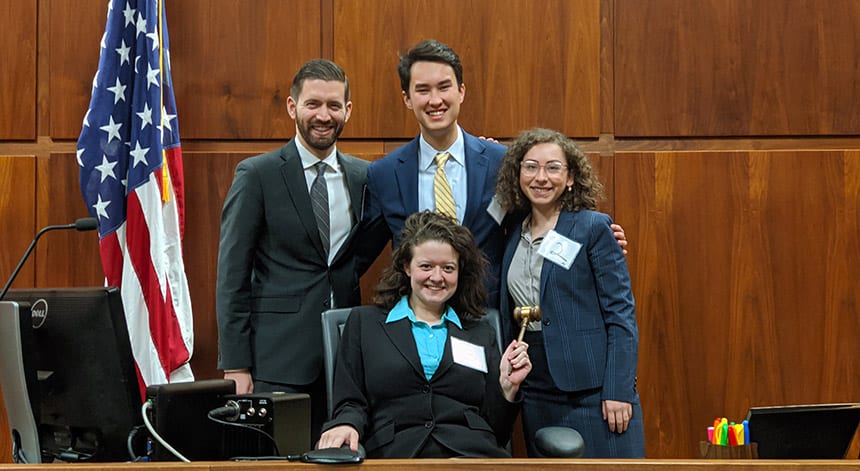
By Andrew Cohen
New Orleans boasts quite a reputation as the epicenter of party culture. No argument from four Berkeley Law students who had plenty to celebrate there recently after winning the American Bar Association Student Trial Advocacy Competition in labor and employment law.
Arguing a mock case involving a whistleblower retaliation claim under the Sarbanes-Oxley Act, Hannah Braidman ’21, Daina Goldenberg ’20, Alex Lyons ’20, and Paul von Autenried ’20 bested more than 50 other law school teams.
Braidman and Lyons represented the plaintiff, a former product manager at a tech company, who asserted that the company had misrepresented its revenues. Goldenberg and von Autenried advocated for the defense, which claimed that the plaintiff was fired for sending inappropriate communications to employees.
“Strong chemistry and cohesion as an attorney pairing is crucial,” Braidman says. “I think that’s where we really succeeded.” Goldenberg notes, “You can’t overemphasize how important it is that all the members of a trial team click. We were fortunate to share that dynamic with each other and with our great coaches (Anthony Guzman ’16 and Forrest McClellan).”
In November, the team took first place at one of the competition’s four regional events in Los Angeles. The top two finishers from each regional advanced to nationals—where the Berkeley Law quartet encountered tough objections from the judges and unpredictable circumstances en route to their final-round triumph over Northwestern.
“For me, the most challenging aspect of the competition was adapting to each opposing team’s approach,” Goldenberg says. “Some teams had a more aggressive style and others were more reserved—it was a dance from round to round.”
After winter break, team members spent 12 to 15 hours a week preparing for nationals, holding practices as a full team and additional meetings in their plaintiff and defendant pairs with the coaches. One tricky hurdle: Lyons is doing a field placement in New York this semester, which forced him to deliver his opening statement during practice sessions—and his performance as a witness for the defense—over FaceTime.
“We used each meeting as a chance to raise new evidentiary objections and practice fighting them, refine tone and pacing, and tighten questioning—particularly on cross examinations—to pin down witnesses,” von Autenried says. “The night before nationals, we cobbled together a full scrimmage with all four team members at our hotel in New Orleans. It was fun to see how everything still held together so well.”
All hands on deck
Berkeley Law’s trial team program is led by Spencer Pahlke ’07, a partner at Walkup, Melodia, Kelly & Schoenberger. He has “devoted countless hours and resources to bringing the program to new heights as a coach, instructor, coordinator, and mentor to Berkeley Law students,” Goldenberg says, fostering a network of dedicated trial team alumni who also volunteer.
Student Co-Directors Amanda Sadra ’20 and Nick Cotter ’20 also helped the cause, scrimmaging against the team before regionals.
In the semifinals, Berkeley Law’s team faced UCLA—the same opponent it had edged for first place at regionals. “The rivalry was pretty intense,” Lyons admits.
There were plenty of light-hearted moments, however. Lyons recounts how in a thick Louisiana accent, one judge advised them to explain to the jury what the SEC (Securities and Exchange Commission) is in the context of a whistleblower retaliation case. In football-mad Louisiana—home of another national champion, Louisiana State University—people think of the SEC as the Southeastern Conference.
Lyons says working with the team improved his own performance, and that “seeing Paul, Daina, and Hannah present their pieces and handle procedural issues in the courtroom was like watching poetry in motion. I was always motivated by their example to try to do the best I could.”
Each team member performed an opening or closing argument, direct examination, and cross examination, and credited Guzman and McLellan—busy full-time attorneys with real trials and clients to worry about—for guiding them to victory.
“Their dedication was inspiring,” Braidman says. “They brought practical experience to the themes of our cases, and it was amazing having them there to say, ‘You know, attorneys would never say that in a real trial, let’s scrap it and do this instead.’ That was helpful beyond belief.”
A trip to New Orleans also sustained motivation.
“I still have dreams about the shrimp and grits I had the first night,” Lyons says.